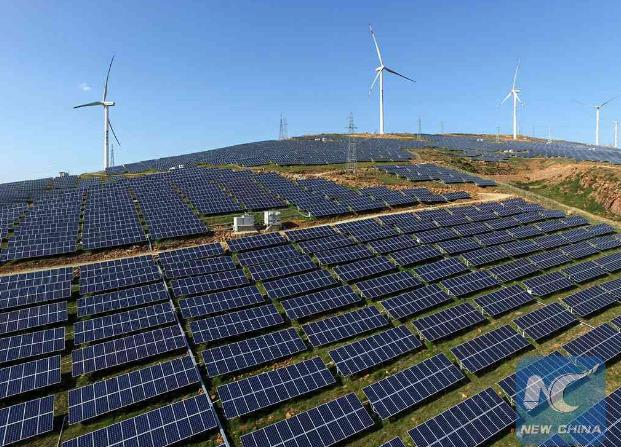China dominates the world in renewable energy
- By Gemma Yates
 0 Comment(s)
0 Comment(s) Print
Print E-mail China.org.cn, May 27, 2017
E-mail China.org.cn, May 27, 2017
|
|
|
A green energy base provides both wind and solar power in Yiyang County, central China's Henan Province, May 15, 2016. [Xinhua file photo] |
However, what makes China different to other high polluters is the fact that China has not only set anti-pollution and renewable energy targets – but is achieving them. While other nations seem to make no more than token efforts to get emissions down, China has put considerable effort and investment into improving its green credentials – and it is working.
This is in direct contrast to the other major polluters, which appear to be returning to fossil fuels with a vengeance.
China's commitment to renewables
When asked to think of a polluted city, an image of smoggy Beijing pops into the minds of many around the globe. In foreign perception, China's cities are smoke-swirled pollution pits, reeking of exhaust fumes, and not to be ventured into without an oxygen supply.
The trend for wearing face masks in China has done little to disperse this idea. In all fairness, Beijing and other large Chinese urban centers do have something of a problem with air pollution. However, it's getting a lot better – largely because of the Chinese government's ironclad resolve to clean up the nation's air.
After declaring "War on Pollution" in 2014, the government has pursued a firm policy of cracking down on polluters, and improving its renewable infrastructure. Measures aimed at reducing pollution include:
• Penalties for "dirty" construction methods.
• Penalties for businesses which pollute.
• Stringent anti-pollution regulations.
• Frequent inspections of construction sites and businesses, checking that anti-pollution regulations are being kept.
• Greater powers given to environmental protection officers.
• A 23 percent increase in the environmental protection budget.
• A government-led drive to switch to renewable forms of energy.
Essentially, as the U.K.'s Guardian newspaper puts it, China has given its environmental protectors "teeth," and they're using them to noticeable effect. China's air is improving, its pollution levels are plummeting, emissions are sinking, and the nation has risen to the position of world leader where renewable forms of energy are concerned.
America turns to fossil fuels
Meanwhile the other major polluters – the USA and Russia – are demonstrating an enthusiasm for fossil fuels which is very worrying for some, particularly as their enthusiasm is affecting the rest of the world.
In the U.K., for example, it was slowly getting easier for consumers to adopt renewable energy suppliers. However, pressure from Russia and the USA to buy their fossil fuels as part of trade deals has seen the U.K.'s commitment to renewables waver. Similar patterns are occurring elsewhere.
Of course, POTUS Donald Trump and his supporters are not as bothered by this as environmentalists – Trump and his administration are largely of the opinion that climate change is a hoax perpetuated to destroy the American fossil fuels industry. They thus see their throwing of weight behind the said industry as a noble, patriotic, and protective measure.
And it's quite a weight – the USA can bring a lot of pressure to bear on international markets. And Russia, with their vast gas and coal reserves, are naturally keen to push their wares. However, the vast, vast majority of scientists worldwide disagree with the Trump administration's view that climate change does not exist, and are deeply concerned about the increasing damage being done to the world's fragile environment by continued fossil fuel emissions.
Renewable influence
So what does all this mean, on a global environmental scale? China is, as mentioned, the world's largest polluter. That China is taking serious measures to turn to renewables and cut back its emissions is a hugely positive sign from an environmental point of view.
However, if the world's second largest polluter – the USA (and, by extension, all nations within its trading sphere of influence) – is increasing its emissions, there is a danger that things will simply "balance out," and global emission rates will continue at their current deadly rate.
However, as the political and economic situation in many other regions of the world becomes increasingly precarious, China's influence (both political and economic) is growing enormously. If China can extend her "War on Pollution" beyond her borders, and influence other nations to turn renewable just as she has done, there may be hope for the environment yet.
Gemma Yates is a freelance writer and mother. She left her career in business management in healthcare after becoming a mother for the first time and has now embarked on a writing career.
Opinion articles reflect the views of their authors, not necessarily those of China.org.cn.







Go to Forum >>0 Comment(s)